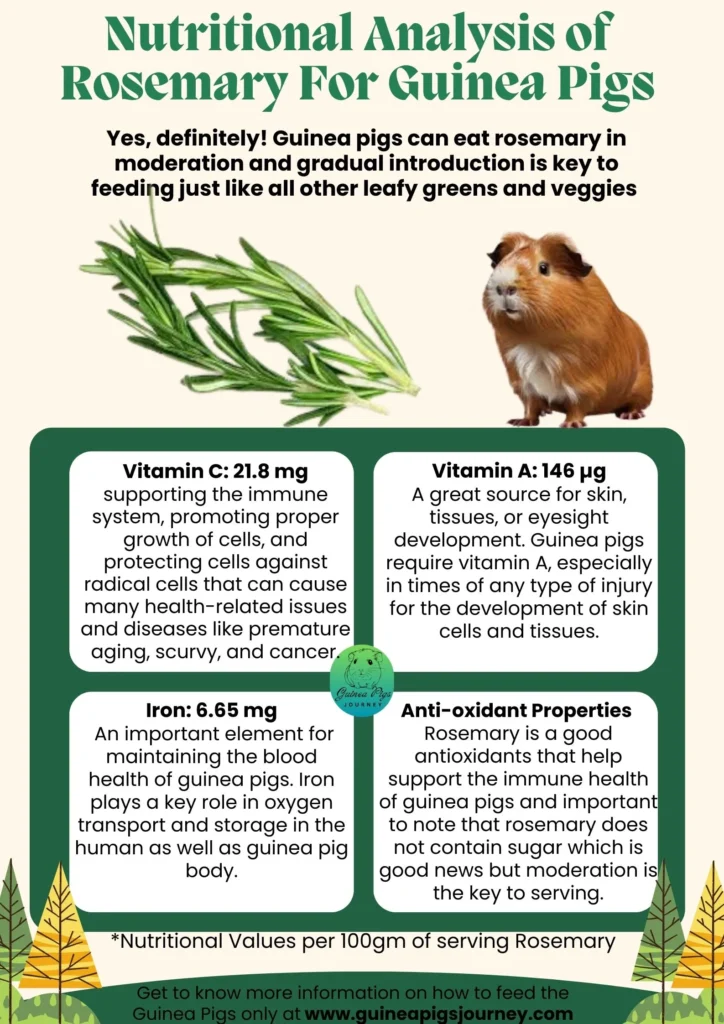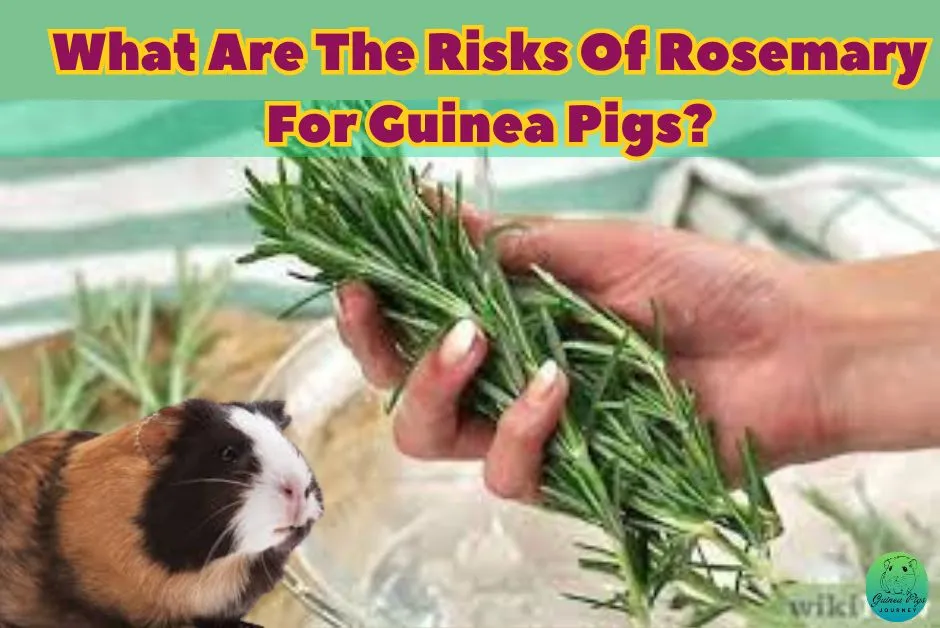Rosemary! A member of the mint family Lamiaceae, along with other herbs such as oregano, thyme, basil, and lavender, and a good source of Iron, calcium, Vitamin B-6, and many other nutrients good for humans, but the question is Can guinea pigs eat rosemary, a herb to achieve such benefits and what would be the risks;
Yes, definitely! Guinea pigs can eat rosemary in moderation and gradual introduction is key to feeding just like all other leafy greens and veggies such as cilantro, arugula, mustard greens, asparagus, sugar snap peas, green beans, zucchini, etc. to ensure a well-balanced and suitable diet for optimum use of nutrients for guinea pigs. Rosemary is a good source of vitamin C, antioxidants, and minerals and can provide good health benefits if fed in moderation.
Although rosemary is not found in its natural environment but is still safe to feed your guinea pigs and can be a tasty addition as a treat. However, it is an herb and has a strong aroma and essential oil can be overwhelming, so it is very important to know about the nutritional benefits, risks, and frequency and portion of serving rosemary for guinea pigs along with the safe parts of the rosemary plant.
Guinea Pigs Nutritional Requirements:
Guinea pigs are herbivores creatures based on a plant-based diet and their owners must know “The recommended and best diet for their guinea pigs” as well as those “Foods not recommended to feed guinea pigs” to maintain their overall health and long span of life.
Guinea pigs naturally graze on fresh and good quality hay which makes up 80-90 % of most of their diet along with 10 % of fresh and good quality fruits and vegetables as a treat in moderation. Guinea pigs can also be served with some amount of only dedicated guinea pig pallets but it should not be part of their main staple and should be served the recommended portion or mentioned on pallets bag for guinea pigs. Guinea pigs should also be served with fresh, clean, chlorine-free drinking water at all times and must be checked and changed twice a day for their good health.
The list of safe food that can be fed to guinea pigs is so long that needs great care to know the best way of feeding guinea pigs.
Rosemary for guinea pigs can be a nutritious addition if served in moderation as well as a gradual introduction if you are serving rosemary for the first time to your guinea pigs, it will ensure the limitation and frequency of serving rosemary for guinea pigs to achieve the potential benefits. It is also very important to first know the nutritional analysis of rosemary so that an owner can decide on the quantity and portion of serving to ensure moderation.
Nutritional Analysis Of Rosemary For Guinea Pigs:

Rosemary is one of the most popular aromatic and medicinal plants worldwide, not only beneficial for humans but also for guinea pigs due to its healthy nutritional benefits. It is very important to understand the nutritional values of rosemary plants while ensuring the moderation process in feeding your cavies. According to the USDA food database, listed below are the nutritional values and percentage per 100 grams of rosemary for guinea pigs.
| Nutrients | Value per 100 grams | Daily Value (DV %) |
| Calories | 131 kcal | |
| Carbohydrates | 20.7 grams | 8 % |
| Water | 67.8 grams | |
| Fat | 5.86 gram | 8 % |
| Protein | 3.31 grams | 7 % |
| Dietary Fiber | 14.1 grams | 50 % |
| Ash | 2.35 grams | |
| Net Carbs | 6.6 grams | |
| Vitamin C, total ascorbic acid | 21.8 mg | 24 % |
| Vitamin A, RAE | 146 µg | 16 % |
| Vitamin B6 | 0.336 mg | 20 % |
| Vitamin D | 0 mcg | 0 % |
| Cholesterol | 0.00 mg | 0 % |
| Fatty Acid | 2.84 g | |
| Calcium, Ca | 317 mg | 24 % |
| Phosphorus, P | 66 mg | 5 % |
| Potassium, K | 668 mg | 14 % |
| Iron, Fe | 6.65 mg | 37 % |
| Magnesium, Mg | 33 mg | 22 % |
| Zinc, Zn | 91 mg | 8 % |
| Sodium, Na | 26 mg | 1 % |
| Copper, Cu | 0.301 mg | 33 % |
| Manganese | 0.96 mg | 42 % |
| Folate | 109 µg | |
| Saturated Fat | 2.83 | 14 % |
Note: * The % Daily Value (DV) indicates how much a nutrient in a serving of food subsidizes a daily diet.
What Are The Nutritional Benefits Of Rosemary For Guinea Pigs?

Vitamin A: Rosemary for guinea pigs contains almost Vitamin A almost 146 µg i.e. 16% per 100 gm. of rosemary a great source for skin, tissues, or eyesight development. Guinea pigs require vitamin A, especially in times of any type of injury for the development of skin cells and tissues. Vitamin A for guinea pigs also helps to protect against the free radicals which can cause many diseases including cancer in guinea pigs.
Vitamin A helps guinea pigs with the development and growth of cells and the overall body would help them in working of heart, lungs, and other organs properly. Vitamin A also boosts the immune system of guinea pigs.
Vitamin C: Rosemary for guinea pigs contains almost Vitamin C almost 21.8 mg i.e. 24 % per 100 gm. of rosemary which helps in the prevention of a dangerous disease called scurvy in guinea pigs which can even lead to malnutrition and sometimes can also cause death. Just like humans, guinea pigs cannot produce their vitamin C and require an external source like rosemary which is also a good source of vitamin C for guinea pigs. Vitamin C also helps guinea pigs build a strong and secure immune system that can fight against many viruses and bacteria to keep guinea pigs safe and healthy.
Vitamin C also protects and recovers guinea pigs from any kind of infection be it fungal or anyone that can breed secondary infection because guinea pigs are very easy to get targeted and infected and defending it requires a powerhouse of nutrients like Vitamin C.
Iron: Rosemary contains almost 6.65 mg i.e. 37 % per 100 gm. of rosemary important for maintaining the blood health in guinea pigs. Iron plays a key role in oxygen transport and storage in the human as well as guinea pig body. Iron is a part of hemoglobin protein which is contained in red blood cells responsible for oxygen transport and carbon dioxide removal in organs and tissues of guinea pigs. Hemoglobin protein also transports carbon dioxide out of the guinea pig’s tissues and organs.
Guinea pigs can become anemic if they do not get the proper enough iron they need for their body to ensure their organs and cells are working properly.
High source of Potassium: Rosemary contains potassium almost 668 mg i.e. 14 % per 100 grams, heart-healthy mineral potassium plays a key role in signal propagation, vascular tone, systemic blood pressure, homeostasis, fluid and electrolyte balance, and hormone secretion in guinea pigs. Guinea pigs require potassium to naturally lower blood pressure because it counteracts the effects of a high sodium diet in guinea pigs.
Antioxidants: Rosemary is a good antioxidants that help support the immune health of guinea pigs and important to note that rosemary does not contain sugar which is good news but moderation is the key to serving.
Improve Digestion: Rosemary contains almost 14.1 grams i.e. 50 % per 100 gm. Fiber and other essential electrolytes are beneficial for digestive health in guinea pigs and recommended for digestive issues but in moderation. Rosemary contains a good amount of dietary fiber helping guinea pigs with digestive issues like diarrhea and relief from constipation.
What Are The Risks Of Rosemary For Guinea Pigs?

Urinary Tract Issues: Rosemary is a high source of calcium containing almost 317 mg i.e. 24 % per 100 grams of serving rosemary for guinea pigs. Unfortunately, that rich amount can be dangerous for guinea pigs and can cause urinary tract issues including urinary tract infections that can lead to the formation of bladder and kidney stones in guinea pigs if moderation is not ensured. Urinary tract issues for guinea pigs are so painful that they cannot pee properly and even in some cases they stop peeing if the urethra is blocked by stones.
Guinea pigs require a certain amount of calcium in their diet, excess amount can cause serious health issues as stated above so, for their overall body health it is important to have the moderation process in mind while serving any new food including rosemary for guinea pigs to prevent these type of unhealthy and unpleasant complications.
High Source of Carbohydrates and Fats: Rosemary is also rich in carbohydrates and fats i.e. 20.7 % and 5.86% respectively per 100-gram serving of rosemary for guinea pigs. Feeding these types of foods without moderation to your guinea pig can cause digestive upset and increase the risk of obesity and weight gain subsequently leading to health problems like diabetes. For the best working of guinea pigs ensure that their diet is low in fat and carbohydrates to avoid any kind of health-related issues.
Digestive Upset: Guinea pigs have sensitive digestive systems, and introducing new foods like rosemary too quickly or in large amounts that have a high source of fiber can lead to digestive upset. Excessive feeding of rosemary may result in symptoms such as diarrhea, bloating, or gastrointestinal discomfort which can affect the overall health of guinea pigs. So, ensure moderation and gradual introduction for the sake of love and care for guinea pigs!
Allergic Reaction: Watch out for any kind of possible allergic reaction that can cause discomfort due to rosemary for guinea pigs. It depends on Individual guinea pigs, some may be allergic to rosemary and some may adjust it very easily. It is very important for guinea parents to consult a vet before introducing rosemary to guinea pigs’ diet and always monitor the reaction or any change in guinea pig’s behavior if you introduce any new food to the guinea diet, then immediately contact your veterinarian for further guidance.
How Often Can Guinea Pigs Eat Rosemary? (Frequency and Size of Serving Rosemary)
This question is very important to understand because it gives you an idea and knowledge about the moderation process for guinea pigs which is very crucial before serving any new diet including rosemary for guinea pigs. Let’s understand the Frequency and size/portion of serving rosemary for guinea pigs.

Frequency of Serving Rosemary for Guinea pigs:
The recommended frequency for serving rosemary is sparingly not more than once or twice a week per guinea pig in moderation as a key for varied and accurate measurement diet. Rosemary should be introduced gradually, carefully, and infrequently to avoid digestive upset and other serious health-related issues as explained above.
Portion/Size of Serving Rosemary for Guinea Pigs:
The recommended portion and size of rosemary for guinea pigs is two or three leaves per guinea pig to sprinkle or mix up a little with other safe leafy greens or veggies as a treat but ensure the moderation, your guinea will love to enjoy the rosemary treat containing important micronutrients beneficial for guinea pigs.
**Important Note: Always consult or speak to your veterinarian for advice on correct and accurate measurement for any new diet including rosemary for optimum gain of nutritional benefits and avoid any kind of unpleasant or hazardous situation for little furry friends.
How to Prepare Rosemary for Guinea Pigs?

- Purchase/choose a good quality and fresh, green, healthy, and most importantly organically produced strings of rosemary for guinea pigs from a verified dealer or store. Ensure that rosemary strings are not overly wilted and spoiled.
- Thoroughly wash the rosemary strings in cold running water to remove any dust particles, chemicals, pesticides, or traces of germs, and let them dry after washing before serving.
- You can also remove or cut the stalk/stem of rosemary but this is optional. Although guinea pigs can eat these parts very easily and enjoy it.
- Chop rosemary into small pieces as a treat, however guinea pigs can eat the stems/stalks without chopping or cutting.
- It is very important after preparing rosemary, introduce it in appropriate quantity to ensure moderation and if it is their first time then introduce a small portion i.e. one spring for each guinea pig, and observe their reaction to adopting this new diet.
- You can also serve them like ½ amount in the morning and the other half in the evening to ensure moderation and gradual introduction.
- You may also give rosemary by mixing it with other veggies to your guinea pigs as a healthy and nutritious treat.
In the end, the most important task to do is that when your guinea pigs are done eating rosemary, be sure to check and remove the uneaten cilantro from the cage or their surroundings to avoid the multiplication of bacteria and inviting flies that can be harmful to guinea pigs.
Can Guinea Pigs Eat Rosemary All Parts?
Guinea pigs love to eat rosemary as a varied and delicious treat and enjoy its flavor and aroma. But knowing about the parts of rosemary to feed guinea pigs is equally important for their overall health.

Can Guinea Pigs Eat Rosemary Stems?
Yes, guinea pigs can eat the stems of rosemary which would add additional nutritional benefits as it also contains antioxidants. Just make sure that rosemary stems are fresh and washed before serving to guinea pigs.
Can Guinea Pigs Eat Rosemary Flowers?
Yes, guinea pigs can eat the flowers of rosemary in moderation as it is totally safe for them and boosts their immune system, it would definitely keep your guinea pigs healthy and happy. Just make sure that before serving the rosemary flowers, wash them properly in cool running water to remove any kind of dirt or pesticides. Remember! Moderation and gradual introduction are keys to serving.
Can Guinea Pigs Eat Rosemary Leaves?
Yes, rosemary leaves are totally safe for guinea pigs in moderation. Rosemary leaves are a great source of important nutrients like vitamin C, Iron, Potassium, etc.
Can Guinea Pigs Eat Rosemary Stalks?
No, it is not recommended to feed rosemary stalks to guinea pigs. While rosemary is generally safe for guinea pigs to consume in moderation as an occasional treat, the stalks can be tough and difficult for them to chew and digest which can also hurt their gums and teeth.
Can Guinea Pigs Eat Rosemary Roots?
No, guinea pigs should not eat rosemary roots. The roots of rosemary, like many other plant roots, are not suitable for guinea pig consumption. They may contain compounds that could be harmful to guinea pigs or cause digestive issues. It is recommended that stick to the leaves and stalks parts of rosemary which are safe to feed guinea pigs.
Can Guinea Pigs Eat Rosemary Seeds?
Generally, it is not recommended to offer rosemary seeds to guinea pigs but you can offer rosemary seed powder and to ensure a safe treat you can grind the seeds yourself for your cavies because rosemary seeds contain carnosic acid, a compound known for its powerful antioxidant properties. Studies have found that carnosic acid can slow the growth of cancer cells in the body and even lower the risk of developing tumors.
Can Guinea Pigs Eat Rosemary Springs?
Yes, Guinea pigs can eat the springs of rosemary plants in moderation which would also enhance the nutritional benefits for guinea pigs like vitamin C, Iron, Vitamin A, Fiber, etc.
Alternatives of Rosemary for Guinea Pigs:
Although guinea pigs enjoy rosemary in their diet still some individual guinea pigs may like or dislike the rosemary in their diet, so there must be an alternative to this herb in their diet to fulfill nutritional requirements. Listed below are some herbs as an alternative to rosemary for guinea pigs.

Cilantro: Cilantro is perfectly safe to feed guinea pigs in moderation, and with gradual introduction guinea pigs love and enjoy its fragrance and citrusy flavor, being one of the best sources of Vitamin C and other beneficial nutrients for guinea pigs.
Oregano: Guinea pigs can also eat oregano as it also provides nutritional benefits for them.
Fennel: This is also a powerhouse of nutrients for guinea pigs if fed in moderation.
Basil: This herb is a good source of vision and helps boost the immune system of guinea pigs and they love to eat basil in their diet.
Dill: Yes guinea pigs can also eat the dill as an herb and love to enjoy it, dill provides Potassium, Magnesium, and other vitamins for guinea pigs.
Parsley: It belongs to the same plant family as cilantro, and makes an excellent replacement in case guinea pigs dislike rosemary. Parsley does not only enhance flavor, but it is highly nutritious and offers numerous health benefits for guinea pigs. Always feed parsley in moderation because it is rich in oxalic acid which can cause bladder or kidney stones if fed in moderation.
Mint: It is also a healthy addition to the guinea pig’s diet in moderation but it is highly rich in calcium so always feed in a small quantity to avoid any risk for guinea pigs.
Thyme: Guinea pigs can also eat thyme in moderation as it also boosts the immune system of guinea pigs.
Frequently Asked Questions (FAQs):
Can Guinea Pigs Eat Rosemary Flakes?
No, it is not recommended to feed rosemary flakes to guinea pigs because the dried rosemary processing is the same as the flakes are prepared and that also contains less or no nutritional values and benefits for guinea pigs
Can Guinea Pigs Eat Rosemary Every Day?
No, it is not recommended to feed rosemary to guinea pigs every day because rosemary is rich in calcium, carbohydrates, and fats which can affect the overall health of guinea pigs causing bladder or kidney stones, urinary tract issues, digestive issues, etc. It is always recommended to ensure moderation in guinea pig’s diet and serve them the recommended frequency and size of serving as explained above.
Can Guinea Pigs Eat Dried Rosemary?
No, it is not recommended to feed guinea pigs dried rosemary because it contains extra sugar and can stick to the teeth of guinea pigs and dried rosemary does have not as many nutritional benefits as fresh and raw rosemary contains.
Can Guinea Pigs Eat Cooked or Processed Rosemary?
No, it is not recommended to feed guinea pigs cooked or processed rosemary because it contains seasonings, oils, spices, salts, or other additives that can be harmful to guinea pig’s sensitive digestive systems. Always offer your guinea pigs raw and fresh rosemary.
Can Baby Guinea Pigs Eat Rosemary?
Baby guinea Pigs (Pups) can eat rosemary up to the age of almost 4-6 weeks but not before that. As baby guinea pigs reach the age of 3-4 months they can eat most of the food that young and adults subsequently eat. It is best to start with a small portion i.e. a single spring of rosemary leaf for baby guinea pigs reaching the age of 4-6 weeks and increase the portion by monitoring the adjusted strength of baby guinea pigs and offer another little bit after a day or two. Always monitor and observe their reaction after introducing any new food and consult a veterinarian for the best guidance.







